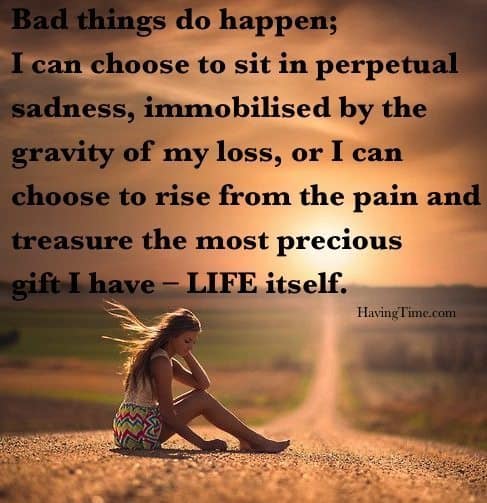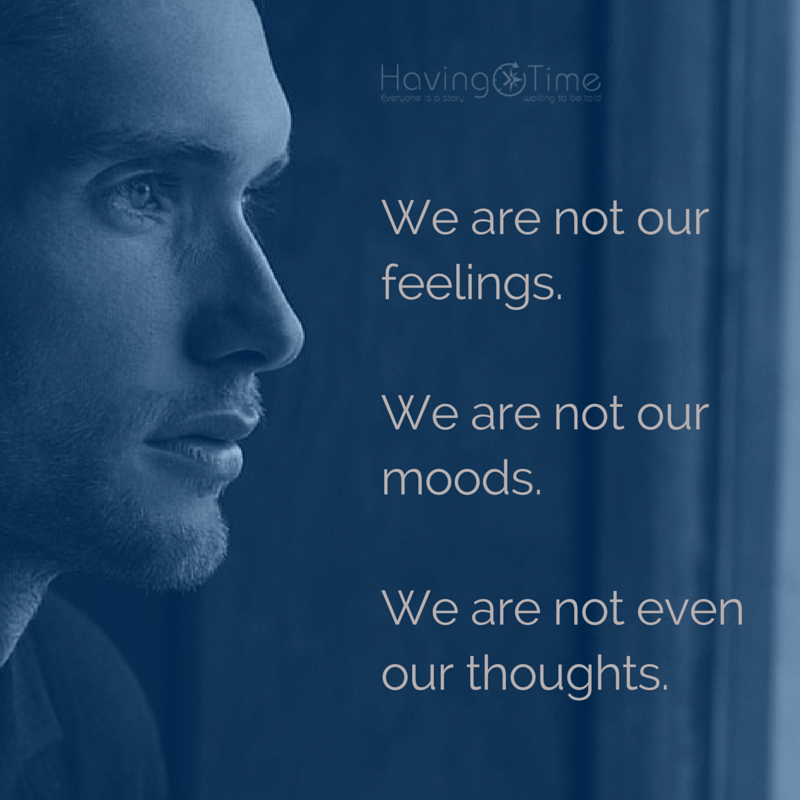By Shereen Soliman

[bctt tweet=”“Letting go gives us freedom and freedom is the only condition for happiness.” –Thich Nhat Hanh” username=”havingtime”]
After facing a chain of traumatic events in a short space of time and having an outburst of emotions to deal with; I got curious and wanted to look closer into how we process our emotions in the Western society. I discovered that we seem to be polarized in our approach to dealing with our feelings. We either don’t validate them and adopt the position of “I’m fine I’M FINE” through gritted teeth or we’re encouraged to wallow in them and make an identity out of the story, while in the background we’re told to shove some pills down our throat to ease the pain.
If you’ve ever shared with someone about a difficult emotional experience you’re facing – you’ll get what I’m talking about. First, there is a chance of the awkward responses when you tell someone about your hard times; then the whole ‘something must be wrong with me’ feeling as they disengage completely, leaving you feeling being totally rejected. And then, off you trot to the Doctors, and before you know it, you’ve got a whole new condition to claim and feed your ego with – and trust me, the ego loves this. Be it PTSD, depression, or something else, it’s a whole new identity to live with and get attention for ‘how bad’ you are feeling. The thing is I’ve been there; I was living this identity. Allowing myself to get carried away with emotions then pulling out the “you have no idea what I’ve been through!” card.

And then I made a conscious decision to choose happiness. I’ve realized that in order to be truly happy I’ve had to go into my inner depth and unpack these emotions, attachments, and traumas before getting to the ‘I’m getting through it’ stage. It’s important to make this distinction and I feel like this is where some people get a bit confused.
Let’s take a closer look – if years after these events I’m swirling around in negativity, flipping between getting angry and suffering in silence because things are too difficult to talk about or maybe blaming others for not treating me right (pulling out that “you have no idea what I’ve been through” card) then I’m probably wallowing in these events without actually processing them.
On the other hand, if I become aware of an emotion as it comes up and I stop, sit with it and ask myself why has this upset me/made me angry/why am I negative today? Then I take the time to allow myself to express it fully until I don’t feel the need to express it anymore and afterward pivot towards a generally positive sense of wellbeing, then this is the start of unpacking my emotions.
Most negative emotions that are experienced come from traumatic events that haven’t been unpacked fully, a lot of which lie in our subconscious yet can control our behavior. If the emotion had been unpacked fully then there wouldn’t be any negativity around it because it would have been accepted and dealt with already.

What about people who don’t feel like they’ve been through a ‘traumatic’ situation but experience a lot of negative emotions I hear you ask? Well, hardly anyone is trauma-free. The majority of us would have experienced minor traumas in our childhood that we haven’t addressed which later manifest in our psyche (such as self-limiting beliefs, depression, anxiety etc) and sometimes in our physical body (check out Louise Hays book You can Heal Your Life). I’m sorry if this is the first time you’ve heard that you’re probably traumatized in some way, but hey, you’re reading this post and I’m going to share with you some great info to help you unpack these traumas – Yeah to you!
How to Unpack Your Emotional Baggage in 5 Easy Steps
1. Give Meditation a Go!
Did you know that meditation connects the emotional and logical parts of your brain? And so rather than getting carried away with your emotions you actually become an observer of them. That means that instead of spiraling into depression you can stop yourself and say ‘hmm, I am experiencing some sadness today’.
2. Making the Map of From the Inwards
When an emotion emerges on the surface, just acknowledge it. Learn to accept it and explore it to find out why it’s coming up and where it’s from. It could even be a seemingly insignificant event in your childhood that you didn’t realize bothered you, or a recent event that wasn’t fully dealt with.
3. Understanding the Triggers
Work on understanding and unpacking your triggers. What do you find helpful in releasing those heavy emotions? What feels right for you? If that’s acupuncture then go and do it. Beating up a pillow? Do it. Counseling? Book yourself it. Everyone needs and extra help now and then – whether it’s to talk something through with a friend or booking to see a professional. Never stop yourself in your own tracks from getting what you need because of societies stupid stigmas! If it seems that shameful to you, then just keep it a secret, if you don’t tell anyone then no one can judge you.
4. You Too Deserve Compassion
We are all human it’s perfectly normal to have all kinds of emotions – especially negative ones! Even if you have really difficult emotions like guilt and shame come up for how you acted in a certain situation, show yourself compassion and acknowledge that you acted in the best way you could with the tools you had at that time. Be compassionate like you would be towards a dear friend of yours.
5. Listen Closer to Yourself
Listen closer to yourself; tap into your feelings and let them steer you on your path. Even with these 5 steps – if they don’t feel right for you, don’t do them, just explore what does work for you right now and deal with what you can when you’re ready. And if you’re not ready that’s ok too, just listen to your body and follow what feels good for now, as long as you feel like you’re processing those emotions in some way, shape or form.
Final Thoughts
Like most things in life, unpacking emotions takes work. It can be uncomfortable at times and it can require persistence to get through the sticky parts but the rewards are worth it.
“Only when we are brave enough to explore the darkness will we discover the infinite powers of our light” Brené Brown, Shame and Vulnerability Researcher.
Now with this knowledge wouldn’t you choose happiness too?


